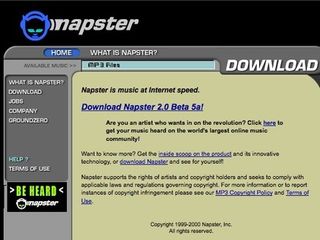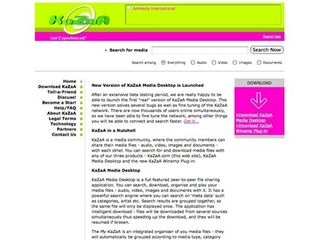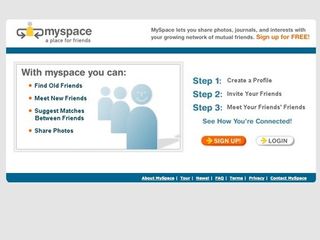8 infamous tech firms that went straight
Can net notoriety ever have a happy ending?
When the Pirate Bay announced its plans to go legit, a strange sound filled TechRadar Towers: "here we go again," we sighed in unison.
Over the years all kinds of tech terrors have gone straight, and the stories rarely have happy endings.
So can internet baddies become goodies and not just survive, but thrive? Come with us as we discover what happened to some of the net's most notorious sites and services.
1. Napster
After two years of annoying Metallica and giving the music business the willies, music file sharing service Napster was shut down in 2001 and was reborn as a legitimate music service in 2003.
While bad Napster and good Napster were both about music, they were completely different beasts: the former was a file sharing system, while the latter was a download and streaming service; the former had millions of songs, and the latter a few hundred thousand; and of course bad Napster was free while good Napster cost money.
Inevitably, Napster's subscriber numbers are tiny compared to bad Napster's tens of millions of users.
Get daily insight, inspiration and deals in your inbox
Sign up for breaking news, reviews, opinion, top tech deals, and more.

2. Kazaa
Bad Napster's successor, Kazaa, suffered a similar fate to its inspiration: after losing a court battle with the entertainment industry, it relaunched in 2006 as a legal music download service.
As with Napster, all that remained of the original service was the name and the logo: today, it's the property of Brilliant Digital Entertainment, a media firm. Kazaa's founders went on to create Skype and Joost.

3. iMesh
This peer to peer music site was sued by the Recording Industry of America - are you starting to see a pattern here? - in 2003, and iMesh settled in 2004. According to the RIAA, iMesh agreed to pay $4.1 million in damages, but unusually the RIAA let the service continue while it developed Mesh 6.0, a legal, paid-for version of iMesh.
That launched in 2005, and iMesh now advertises itself as a legal P2P service. Copyrighted content costs money (and is only available in certain countries, so for example subscriptions are only available in the US and Canada), and iMesh uses audio fingerprinting technology to ensure that users don't share anything they shouldn't.

4. MySpace
The first version of MySpace, owned by LA firm Intermix Media, was sued by New York State Attorney General Eliot Spitzer, who alleged that the firm was illegally sending pop-up ads and spyware to children.
Incoming CEO Richard Rosenblatt transformed the company, "cleaning up the business, changing the business models, addressing lawsuits and all related issues head on," he recalls.
By 2005 MySpace was a massive success, and Rosenblatt sold Intermix to Rupert Murdoch's News Corp. for a tidy $580 million.

5. Cult of the Dead Cow
Going legit is perhaps the wrong phrase to describe Cult of the Dead Cow's recent activities, because while the legendary hacking group did indeed produce tools that could be used for evil - such as the infamous Back Orifice program, which can be used to remotely access Windows boxes - the purpose of such tools was to embarrass companies.
In recent years cDc has become best known for its humanitarian work, dubbed "hacktivism", with the group using its expertise to fight censorship and create tools that dissidents can use to smuggle data from repressive regimes.

6. Gator
By 2003, Gator's adware software was installed on 34 million PCs - and it was fighting multiple lawsuits from firms such as The New York Times and Dow Jones for surreptitiously replacing ads on their sites.
The name Gator became synonymous with spyware, prompting the firm to threaten libel lawsuits in 2004, but the firm rebranded, called itself Claria and announced that it was leaving the advertising business in 2006.
It sold the Gator.com domain in 2008, rebranded yet again as Jelly Cloud, and shut down altogether in October 2008.

7. YouTorrent
The Pirate Bay isn't the only torrent site going straight. Just four months after its debut, YouTorrent decided to go legit in April of 2008.
It now describes itself as the world's largest legal torrent search engine, which we suspect may be pushing things: searching for "the" returns a massive 623 results.

8. Optinrealbig.com
Depending on who you speak to, Scott Richter is either an incredibly smart marketer or The Spam King. Microsoft certainly plumped for the latter, suing him as "one of the top spammers in the world" and settling for $7 million in damages.
Richter agreed to comply with anti-spam laws and Optinrealbig.com became Media Breakaway, which was promptly sued by MySpace for, you've guessed it, spamming. MySpace was awarded $1.2 million in fees and $4.8 million in damages in 2008, although Richter says the spammers were affiliates rather than his employees.
Just two weeks ago Richter spoke to Murraynewlands.com, describing the problems of "fraudulent affiliates" and pointing out that he does a lot of work for charity.

Writer, broadcaster, musician and kitchen gadget obsessive Carrie Marshall has been writing about tech since 1998, contributing sage advice and odd opinions to all kinds of magazines and websites as well as writing more than a dozen books. Her memoir, Carrie Kills A Man, is on sale now and her next book, about pop music, is out in 2025. She is the singer in Glaswegian rock band Unquiet Mind.
